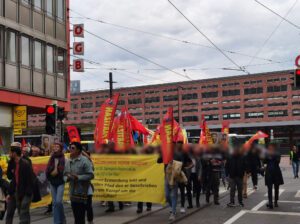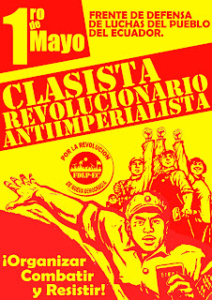
INTERVIEW: In Rio, peasants have to sell even their sweat to survive the crisis
We publish this unofficial translation of a interview in the newspaper A Nova Democracia here.
Subjected to hunger, with worn-out tools, in a long and exhausting workday and with the commerce brutally harmed as the unprecedented economic crisis of imperialism advances, impoverishing the people more and more, Luiz Sérgio struggles to be able to support his family’s livelihood. He lives in a location far from the city center, in a rural area that survives threatened by the Ternium steel company.
In the first months of 2023, affected by the increase of misery and poverty caused by the old Brazilian State, as well as by the paramilitary oppression in defense of the big property, thousands of families mobilize for the just taking of the land for those who live and work on it, under the banner of the LCP and the FNL – Campo e Cidade [Liga dos Camponeses Pobres and Frente Nacional de Luta – Campo e Cidade].
In AND’s recent interview, Luiz describes how this situation of his harvest, the relationship of small commerce with the local community, as well as implications of the presence of the Ternium steel company for the local labor and the region. He also denounces the abandonment of the old State and the electoral farce, with interventions also made by peasants and local traders.
The establishment in Brazil of the company Ternium, formerly TKCSA, or Thyssen Krupp Companhia Siderúrgica do Atlântico (until 2017), was made with nothing more than a single letter from the opportunistic PT government, implemented under the thesis that Brazil would need a new development pattern to, hypothetically, increase the industrialization of the country. Based on the “Letter to the Brazilian people”, which committed to a gradual transition from the “neoliberal programs” to a soft and conciliatory policy typical of the PT government, in 2010 the operations of the infamous Ternium began in the neighborhood of Santa Cruz, the area west of Rio de Janeiro.
The result of this sell-out and anti-popular deception – of supposed developmentalist content – can be seen in the environmental impacts, because the neighborhood today is known for the “silver rain” that occurred in 2012 due to the pollution caused by the steelworks and which has caused a growing wave of serious respiratory problems in the local population. The same company, based in Luxembourg has already been sued by the community, but continues to pollute, not only the air, also the water, which directly affects the life and work of the local community, especially small peasants who farmed there long before its installation.
The interview follows:
New Democracy (AND): What foods do you produce and sell? And what are the main difficulties for the peasant in the region?
Luiz (L): I work with cassava. One of the problems is the rain, which has ruined my planting for three years, the other is air pollution.
AND: How is the relationship between the small peasant and the local community nowadays?
L: The relationship is complicated. There is a lack of money for the village and the sales are hurt. If I can’t sell, I don’t eat.
AND: Is there any relationship between you and Ternium?
L: I don’t have any connection with the steel company, but I think the pollution affects my life and my business a lot.
AND: Do you have any perspective of change in relation to the electoral parties and the elections?
L: Look, no party is going to change my situation. There was Bolsonaro and the (emergency) aid, and the promises he made that the aid price would be maintained at the peak of the pandemic, but in the last months of his government, the aid quota has decreased considerably. Lula is another, but, they are all the same: they promise and do nothing. Three months have passed and so far nothing has changed. Politicians live well at the expense of the people, and they don’t take any loss, only us. My work tools, for example, are very worn out, they make planting very difficult. I affirm that only the struggle itself can change our situation.
(At this moment, another peasant, Antônio Caetano, intervenes with a political denouncement)
Antônio Caetano (AC): There is the case of Sérgio Cabral, for example, who promised, became the “father of the people”, it was proven that he stole everything he had to steal (of money and resources of the people), but he is already at large. I am a legal entity, and for lack of money I can’t even fix my car, which is very important for my work. I only pay the essentials, I can’t pay the taxes. If the police stop me, I will take it easy, as this irregularity is nothing compared to all this theft.
Politicians appear with handouts, smaller and smaller, and part of the people, in the midst of famine, end up considering the politician as a savior, but in reality nothing improves.
(Another peasant, Ivan, intervenes in defense of peasant production and community knowledge)
Ivan (I): Here we plant without using pesticides, because otherwise the cassava hardens.
You could talk to Miyata about this, because he has great knowledge about agriculture. Here we also sell on site, because selling to big wholesalers like Ceasa does not pay off. All the costs of adapting to the logic of wholesale are unsustainable for subsistence. On
Ternium, there is the case of water hoarding, they diverted the water flow of a river last year, affecting production in the surrounding area. As for my work, I hope to improve, but conditions are very hard here. I had tuberculosis and was under treatment for six months, all because I had to harvest cassava at dawn, with cold and heavy rains in the region. Also, with the instruments (of work) worn out, I ended up breaking my collarbone, but I could not do physiotherapy, because I had to stand up to work and support myself. About the political system, I don’t vote, in fact I justify it because I don’t go home to vote if nothing changes. Politicians hardly ever come here, but when they do, they just make promises to get votes and never come back.

